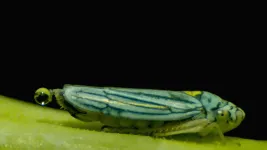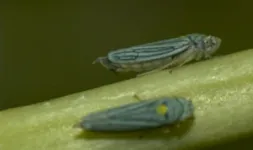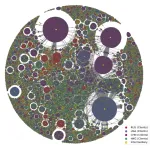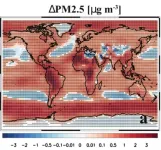(Press-News.org)
Saad Bhamla was in his backyard when he noticed something he had never seen before: an insect urinating. Although nearly impossible to see, the insect formed an almost perfectly round droplet on its tail and then launched it away so quickly that it seemed to disappear. The tiny insect relieved itself repeatedly for hours.
It’s generally taken for granted that what goes in must come out, so when it comes to fluid dynamics in animals, the research is largely focused on feeding rather than excretion. But Bhamla, an assistant professor in the School of Chemical and Biomolecular Engineering at the Georgia Institute of Technology, had a hunch that what he saw wasn’t trivial.
“Little is known about the fluid dynamics of excretion, despite its impact on the morphology, energetics, and behavior of animals,” Bhamla said. “We wanted to see if this tiny insect had come up with any clever engineering or physics innovations in order to pee this way.”
Bhamla and Elio Challita, a bioengineering graduate student, investigated how and why glassy-winged sharpshooters – tiny pests notorious for spreading disease in crops – excrete the way they do. By using computational fluid dynamics and biophysical experiments, the researchers studied the fluidic, energetic, and biomechanical principles of excretion, revealing how an insect smaller than the tip of a pinky finger performs a feat of physics and bioengineering – superpropulsion. Their research, published in Nature Communications, is the first observation and explanation of this phenomenon in a biological system.
Small but Mighty: Observing Insect Excretion
The researchers used high-speed videos and microscopy to observe precisely what was happening on the insect’s tail end. They first identified the role played by a very important biophysical tool called an anal stylus, or, as Bhamla termed, a “butt flicker.”
Challita and Bhamla observed that when the sharpshooter is ready to urinate, the anal stylus rotates from a neutral position backward to make room as the insect squeezes out the liquid. A droplet forms and grows gradually as the stylus remains at the same angle. When the droplet approaches its optimal diameter, the stylus rotates farther back about 15 degrees, and then, like the flippers on a pinball machine, launches the droplet at incredible speed. The stylus can accelerate more than 40Gs – 10 times higher than the fastest sportscars.
“We realized that this insect had effectively evolved a spring and lever like a catapult and that it could use those tools to hurl droplets of pee repeatedly at high accelerations,” Challita said.
Then, the researchers measured the speed of the anal stylus movement and compared them to the speed of the droplets. They made a puzzling observation: the speed of the droplets in air was faster than the anal stylus that flicked them. They expected the droplets to move at the same speed as the anal stylus, but the droplets launched at speeds 1.4 times faster than the stylus itself. The ratio of speed suggested the presence of superpropulsion – a principle previously shown only in synthetic systems in which an elastic projectile receives an energy boost when its launch timing matches the projectile timing, like a diver timing their jump off a springboard.
Upon further observation, they found the stylus compressed the droplets, storing energy due to surface tension just before launch. To test this, the researchers placed the water droplets on an audio speaker, using vibrations to compress them at high speeds. They discovered that, at tiny scales, when water droplets are launched, they store energy due to inherent surface tension. And if timed just right, droplets can be launched at extremely high speeds.
But the question of why sharpshooters urinate in droplets was still unanswered. A sharpshooter’s almost zero-calorie diet consists only of plant xylem sap – a nutrient-deficient liquid containing only water and a trace of minerals. They drink up to 300 times their body weight in xylem sap per day and are therefore required to constantly drink and efficiently excrete their fluid waste, which is 99% water. Different insects, on the other hand, also feed exclusively on xylem sap but can excrete in powerful jets.
The team sent sharpshooter samples to a specialized lab. Micro CT scans enabled Bhamla and Challita to study the sharpshooter’s morphology and take measurements from inside the insects. They used the information to calculate the pressure required for a sharpshooter to push the fluid through its very small anal canal, determining how much energy was required for a sharpshooter to urinate.
Their research reveals that superpropulsive droplet ejection serves as a strategy for sharpshooters to conserve energy per feeding-excretion cycle. Sharpshooters face major fluid dynamic challenges due to their small size and energy constraints, and urinating in droplets is the most energy efficient way for them to excrete.
Promising Applications for Insect Superpropulsion
By combining biology, physics, and engineering, the research has implications for several fields. Understanding the role of excretion in animal behavior, size, and evolution can have applications for ecology and population dynamics. For example, sharpshooters are a major agriculture pest in California and Florida as they spread diseases in vineyards and citrus crops, causing millions of dollars of damage. Sharpshooter excretion could potentially serve as a vector surveillance tool as the issue will likely get worse with climate change. The team’s analysis also stresses the importance of studying excrement processes as they can reveal a multifaceted perspective about an organism’s behavior.
Studying how sharpshooters use superpropulsion can also provide insights into how to design systems that overcome adhesion and viscosity with lower energy. One example is low-power water-ejection wearable electronics, such as a smart watch that uses speaker vibrations to repel water from the device.
“The subject of this study may seem whimsical and esoteric, but it’s from investigations like this that we gain insight into physical processes at size scales outside of our normal human experience,” said Miriam Ashley-Ross, a program director in the Directorate for Biological Sciences at the U.S. National Science Foundation, which partially funded the work. “What the sharpshooters are dealing with would be like us trying to fling away a beachball-sized globe of maple syrup that was stuck to our hand. The efficient method these tiny insects have evolved to solve the problem may lead to bio-inspired solutions for removing solvents in micro-manufacturing applications like electronics or shedding water rapidly from structurally complex surfaces.”
The mere fact that insects urinate is compelling on its own, mostly because people don’t often think about it. But by applying the lens of physics to an everyday miniature biological process, the researchers’ work reveals new dimensions for appreciating small behaviors beyond what meets the eye.
“This work reinforces the idea of curiosity-driven science being valuable,” Challita said. “And the fact that we discovered something that is so interesting – superpropulsion of droplets in a biological system and heroic feats of physics that have applications in other fields – makes it even more fascinating.”
Citation: Elio J. Challita, Prateek Sehgal, Rodrigo Krugner & M. Saad Bhamla. “Droplet superpropulsion in an energetically constrained insect,” Nature Communications (2023).
DOI: https://doi.org/10.1038/s41467-023-36376-5
YouTube video: https://www.youtube.com/watch?v=bO8Xy6-u5Rc
Writer: Catherine Barzler
Video and Multimedia: Candler Hobbs
######
The Georgia Institute of Technology, or Georgia Tech, is one of the top public research universities in the U.S., developing leaders who advance technology and improve the human condition. The Institute offers business, computing, design, engineering, liberal arts, and sciences degrees. Its more than 46,000 students, representing 50 states and more than 150 countries, study at the main campus in Atlanta, at campuses in France and China, and through distance and online learning. As a leading technological university, Georgia Tech is an engine of economic development for Georgia, the Southeast, and the nation, conducting more than $1 billion in research annually for government, industry, and society.
END
Super-fast insect urination powered by the physics of superpropulsion
2023-02-28
ELSE PRESS RELEASES FROM THIS DATE:
Ultrasound device may offer new treatment option for hypertension
2023-02-28
NEW YORK, NY (Feb. 28, 2023)—A device that uses ultrasound to calm overactive nerves in the kidneys may be able to help some people get their blood pressure under control.
A new study led by researchers at Columbia University and Université de Paris, France, has found that the device consistently reduced daytime ambulatory blood pressure by an average of 8.5 points among middle-aged people with hypertension.
Doctors usually prescribe lifestyle changes, such as reducing salt intake or losing weight, and medications to lower blood pressure in patients with hypertension. Yet about one-third of hypertensive ...
Identifying the inflammatory cells behind chemo brain
2023-02-28
COLUMBUS, Ohio – Immune cells that keep the brain free of debris but also contribute to inflammation are the likely culprits behind the concentration and memory problems that sometimes follow one type of chemotherapy, a new study in mice suggests.
Researchers previously showed that female mice given paclitaxel, a drug commonly used to treat breast, ovarian and other cancers, developed memory problems that were linked to inflammation in the brain. Mice receiving a placebo did not develop the “mental fog” phenomenon known as chemo brain.
In this study, the team used a technique to delete immune cells called microglia from the brains ...
Targeting wealth managers would cripple Russia's oligarchs
2023-02-28
From astronomical sums of money to opulent superyachts and lavish villas, the assets of the oligarchs providing the political and financial backing for Russian president Vladimir Putin's military ambitions have been publicly and fervently seized by Western nations since Russia's invasion of Ukraine.
Yet, the invasion—now in its second year—remains largely unabated as Russia's moneyed elite challenge sanctions in court or simply dodge them.
But a new study led by Dartmouth College researchers exposes a massive vulnerability for the Kremlin's critical cadre of billionaires—the small, secretive network of financial experts ...
The highlight advances in planetary science over the past 20 years
2023-02-28
With the development of human space technology, planetary exploration has become one of the most important space exploration activities of mankind. As of December 2021, a total of 252 planetary probes have been launched around the world. The missions reveal the deep space to humankind. In the new paper published in the journal Space: Science & Technology, Yixin Sun et al review some advances in planetary science made by these missions in the past years.
1.Research Advances in Terrestrial Planets
1. ...
Galactic explosion offers astrophysicists new insight into the cosmos
2023-02-28
COLUMBUS, Ohio – Using data from the James Webb Space Telescope’s first year of interstellar observation, an international team of researchers was able to serendipitously view an exploding supernova in a faraway spiral galaxy.
The study, published recently in The Astrophysical Journal Letters, provides new infrared measurements of one of the brightest galaxies in our cosmic neighborhood, NGC 1566, also known as the Spanish Dancer. Located about 40 million miles away from Earth, the galaxy’s extremely active center has led it to become especially popular with scientists aiming to learn more about how star-forming nebulae form and evolve.
In this case, ...
Internet treatment program to prevent child sexual abuse launched in several languages
2023-02-28
Following a successful pilot study, an online anonymous treatment program aimed at reducing child sexual abuse by providing treatment to individuals who exhibit sexual urges towards children is being launched across the EU. It is now available in Swedish, German, and Portuguese as well as in an updated English version. The treatment program, which has been developed by researchers and psychologists at Karolinska Institutet in Sweden, will be evaluated within the framework of an international research collaboration funded by the EU.
"Sexual exploitation of children is a major problem within ...
Liquid nitrogen spray could clean up stubborn moon dust
2023-02-28
PULLMAN, Wash – A liquid nitrogen spray developed by Washington State University researchers can remove almost all of the simulated moon dust from a space suit, potentially solving what is a significant challenge for future moon-landing astronauts.
The sprayer removed more than 98% of moon dust simulant in a vacuum environment with minimal damage to spacesuits, performing better than any techniques that have been investigated previously. The researchers report on their work in the journal, Acta Astronautica.
While people have managed ...
Annals HRSA Special Supplement February 2023 Media Tip Sheet
2023-02-28
LEAWOOD, Kansas—Articles appearing in an Annals of Family Medicine special supplement published yesterday contain observations, insights, and ideas for advancing health care equity, promoting interprofessional collaboration, transforming education, and improving primary care practices.
The supplement, titled, “Advancing Primary Care through Research, Education and Practice: Work of the Health Resources and Services Administration–Supported Academic Units for Primary Care Training and Enhancement,” highlights activities of six HRSA-funded academic units for primary care training enhancement. ...
Breathing is going to get tougher
2023-02-28
Not all pollution comes from people. When global temperatures increase by 4 degrees Celsius, harmful plant emissions and dust will also increase by as much as 14 percent, according to new UC Riverside research.
The research does not account for a simultaneous increase in human-made sources of air pollution, which has already been predicted by other studies.
“We are not looking at human emissions of air pollution, because we can change what we emit,” said James Gomez, UCR doctoral student and lead author of the study. “We can ...
Scientists unveil plan to create biocomputers powered by human brain cells
2023-02-28
Artificial intelligence (AI) has long been inspired by the human brain. This approach proved highly successful: AI boasts impressive achievements – from diagnosing medical conditions to composing poetry. Still, the original model continues to outperform machines in many ways. This is why, for example, we can ‘prove our humanity’ with trivial image tests online. What if instead of trying to make AI more brain-like, we went straight to the source?
Scientists across multiple disciplines ...






